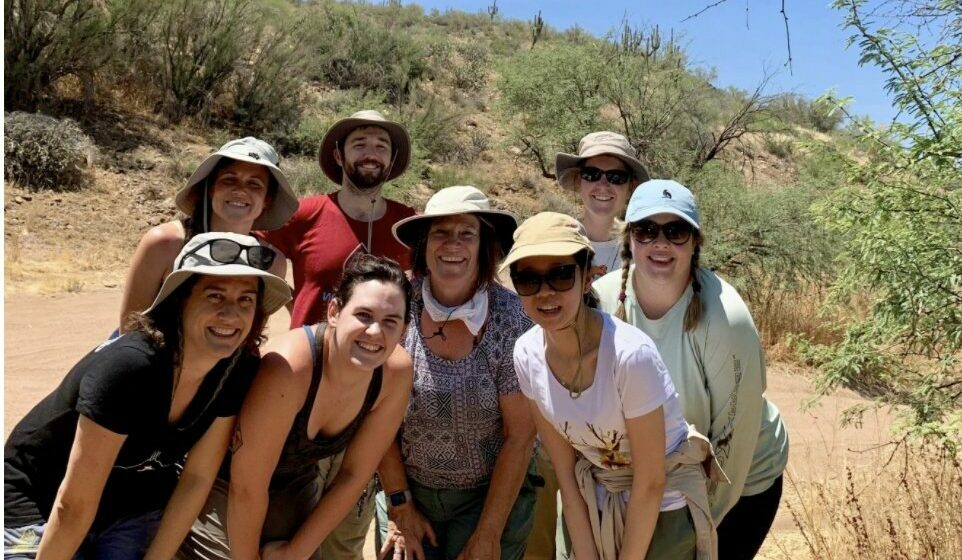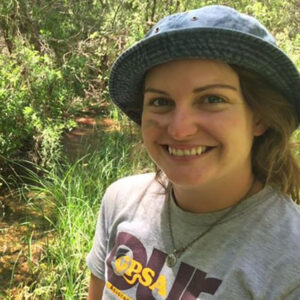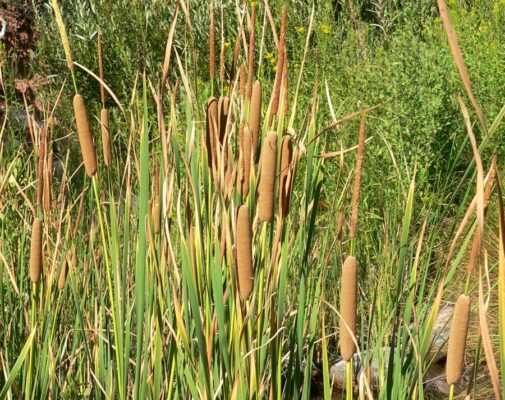
Grad student Marina Lauck with supervisor Dr. Nancy Grimm and lab mates at one of their Arizona field sites.
Credit: CAP LTER
This spotlight is part of an ongoing series featuring many of our LTER Network graduate student representatives who contribute valuable research and leadership across the network. To learn more about LTER graduate research, visit this page.
Marina Lauck is a fourth year PhD candidate at Arizona State University and is the graduate student representative for Central Arizona-Phoenix LTER.
Sidney Gerst, a science communications fellow with the LTER Network Office, interviewed Emilia about her research and her experience in the LTER network.
SG: Thanks for speaking with me today, Marina. Can you tell me a little bit about what your research focuses on?

Marina Lauck of CAP LTER
Credit: CAP LTER
ML: I study the intersection between communities and ecosystem ecology. I specifically work in wetland communities. I want to understand how wetland communities influence ecosystem processes and function under variable environmental conditions. I’m focusing on the functional traits of individual plants in wetland communities to explain how communities as a whole, and the suite of functional traits that they have, can influence ecosystem processes. The climate is really hot and dry here, so a number of plants have different traits to help acclimate them more, retain water, or block the sunlight – plants get too much sun here. In wetland plants, they have Aerenchyma – gas exchange structures that have roots underwater that move oxygen from their leaves to their roots. This can leak into the rhizosphere [the subsurface region where plant roots and their associated microorganisms are found] and could have an effect on benthic restoration.
My fieldwork involved looking at how nitrogen uptake and availability changes in Phoenix’s accidental wetlands with variable water inputs. I was doing eight surveys across the metropolitan area associated with storm drains and looking at what plants were there. I did community transect surveys and took tissue samples to look at nitrogen and carbon. I looked at different sites to see if water availability affected anything. My sites ranged from the outskirts of Phoenix where there are more agricultural inputs, to the downtown metropolitan area with more influence from urban street runoff. Both influence the amount of nitrogen in the storm drainage.
SG: Do you observe much wetland habitat in the Phoenix desert? Wetlands aren’t typically what comes to mind when I think of Arizona!
ML: I get that question a lot! But there are wetlands, even in the Phoenix Metropolitan area. One of the projects that actually got me involved with the LTER involves a river that is dry a lot of the time, but has a lot of inputs from residential areas. All the water drains into this otherwise dry streambed, and as a result “accidental” wetlands popped up. There are these really random wetlands in the middle of the city that are associated with storm drainage networks. There are streams and rivers further out of Phoenix and a little more upland, and wetlands can be found along those streams too. There’s also so much variation in precipitation that you can get a variety of reactions from the different wetland communities. It’s interesting to see how the wetlands function in these really variable conditions.
SG: Why are you passionate about this particular research topic?
ML: I’m originally from Florida and I got involved in wetlands research by working in the Everglades. I really fell in love with wetlands in general. They’re incredible and important for a number of reasons. They’re also under threat; 85% of wetlands have been destroyed or degraded. They are major sources of carbon and nitrogen cycling, and can flip between being sources and sinks depending on what plants or water is there. They are really interesting, cool and provide a number of vital ecosystem functions. They can provide water purification, wildlife habitat, and are major players in these global nitrogen and carbon cycles.
SG: What do you like about working at an LTER site?
ML: I think one of the biggest things for me is the sense of community. I feel like that’s really important, especially as a graduate student. I feel like it’s been very helpful to have sort of a community of people working in parallel. The resources that are available, especially the data resources, are also valuable. There are massive datasets looking at nitrogen deposition, water availability, flora and fauna surveys, as well as socio-economic surveys that you can pull from. The two biggest things are definitely community and the insane amount of data that’s available.

At Sycamore Creek, Marina is looking at the functional traits of Typha domingensis and Paspalum distichum (cattail and knotgrass) in response to water availability and plant stress.
Credit: Marina Lauck, CAP LTER
SG: What do you like specifically about your LTER site? What makes you excited about your research there?
ML: The CAP LTER is a little bit different than some of the other LTERs. We don’t have a specific “site,” it’s the entire Phoenix Metropolitan Area. The LTER team really provides a great sense of community here. We meet a few times a year, we have an annual All Scientists’ meeting in January, and then an academic year meeting. We also have a CAP student group that meets a few times a semester. We’re trying to figure out ways to help each other with field work or collaborate on CAP research grants. They really put a focus on collaboration, interdisciplinarity, and providing a sense of community. There’s a number of opportunities and data available to students including environmental data, social data, and heat data.
Projects can range from collecting plant samples to leading community workshops and conducting surveys – our LTER has a really big focus on integrating ecology with social, political and technological aspects. Community workshops bring together a lot of local community practitioners as well as scientists who do activities such as build gardens at local schools that study the social-ecological impacts of these gardens. There are people that monitor wildlife cameras at local parks, which is really cool. In the metropolitan area there’s all sorts of crazy wildlife, from lizards to coyotes. There are people doing surveys of residential landscapes. Our community’s research and interests are really diverse.
SG: What’s one other LTER site you’d love to visit?
ML: I have two actually. so I’m from Florida, and I worked a bit in the Everglades as an undergrad, but I would love to visit the Florida Coastal Everglades LTER. One that I haven’t visited but would love to is the Georgia Coastal LTER. I mean, the salt marshes are beautiful and cool, and I’d be interested to see how that environment compares with the wetlands I’ve worked in.
SG: What do you do as a Grad rep? What do you hope to happen by connecting grad students across the network?
ML: I am largely focused on trying to connect the students in my community with each other, and with resources that could be helpful to them, as well as to the researchers and faculty in the community. Students are kind of hesitant to, I think, go out and make those connections or reach out to other academics. I try to facilitate that as well as a larger sense of community among the CAP students. So they know that they can go to each other for help, whether it’s with field work, research, or coming up with cool interdisciplinary projects they can do together. I want to create and cultivate that sense of community within the grad students in CAP, but also with the larger CAP community and the larger LTER community. We’re always looking for people to come in with new ideas for meetings or for activities or trying to figure out ways to shorten the distance between these different LTER sites. And so one of the things that we’ve been doing is that we have these small grants to fund meetings or smaller events between LTER sites. Students from different LTER sites can visit each other to network and visit each other’s different sites.
SG: Did you ever think you’d be doing scientific research? What did you think you’d be ‘when you grew up’?
ML: Like so many people in research, and especially ecology, I sort of stumbled into it without realizing it was an option. I’m a first generation student and I didn’t have anyone in my family in the sciences or research or academia in any way. It just never even occurred to me as an option. I always loved being outside and like I said, I grew up practically in the Everglades. So it was always something that I was interested in, but it was like on the weekend. I’d go camping, but didn’t realize I’d make this a career kind of thing. I got really into art in middle school and high school, so the first half of my undergrad, I was a studio art major. Wow. It’s a bit of a switch. When I tell people that, they often say, “doesn’t it go the other way around? Don’t people go into science, and say ‘forget this, I’m going to go paint something.’” But I started taking general education credits, and just really fell in love with my biology classes. And it kind of snowballed from there.
SG: Do you think the studio art background helps with your research at all?
ML: In the sense that I sometimes have to construct my own equipment for certain things. I’m very good with a drill and a saw! I did a lot of woodwork because I was mostly a sculptor more than anything. So, I know my way around power tools and jigging things together, and that’s super important. It’s definitely been helpful. I feel like not a whole lot of scientists can do that and they’re always complaining that something’s broken.
SG: What are some of the most surprising or unexpected experiences you’ve encountered while working at your LTER site?
ML: The integration of ecology with sociology is really interesting. People here have a much more holistic view of ecology, politics, technology, and how they all mesh together. I personally worked on the existence of wetlands and my research questions were very ecology based. I didn’t really incorporate a whole lot of the social components, but they’re really unavoidable in an urban environment. I think that’s the thing that I hadn’t really experienced too much in my research experiences before that. Now it’s hard to separate these ecology questions away from the people that are managing these systems, or using these systems. The accidental wetlands are really important for vulnerable populations. People will go there to beat the heat and a lot of people like to live along the river because it’s cooler as well as a source of water that’s relatively tucked away from others. Even while I was studying the site for purely ecological reasons, the human aspect of it was really hard to ignore.
SG: What’s one thing you wish you knew about science/research/grad school when you were an undergrad?
ML: I like this question. I think the thing that I wish I could go back and tell myself is that it’s okay not to know everything. Because that’s sort of the whole point of science and research is that we’re all learning, and research is about learning, and asking questions. It isn’t a sign of weakness or stupidity, and you never know when someone may have a similar question but be too afraid to speak up, or if your question will make someone think about something differently. The questions you ask could influence the way people think about a subject. Realize that what you have to say matters, and recognize your worth. I think in general that your thoughts and opinions have value and try not to be intimidated by faculty or other researchers or even senior students. Just generally overcoming imposter syndrome.
